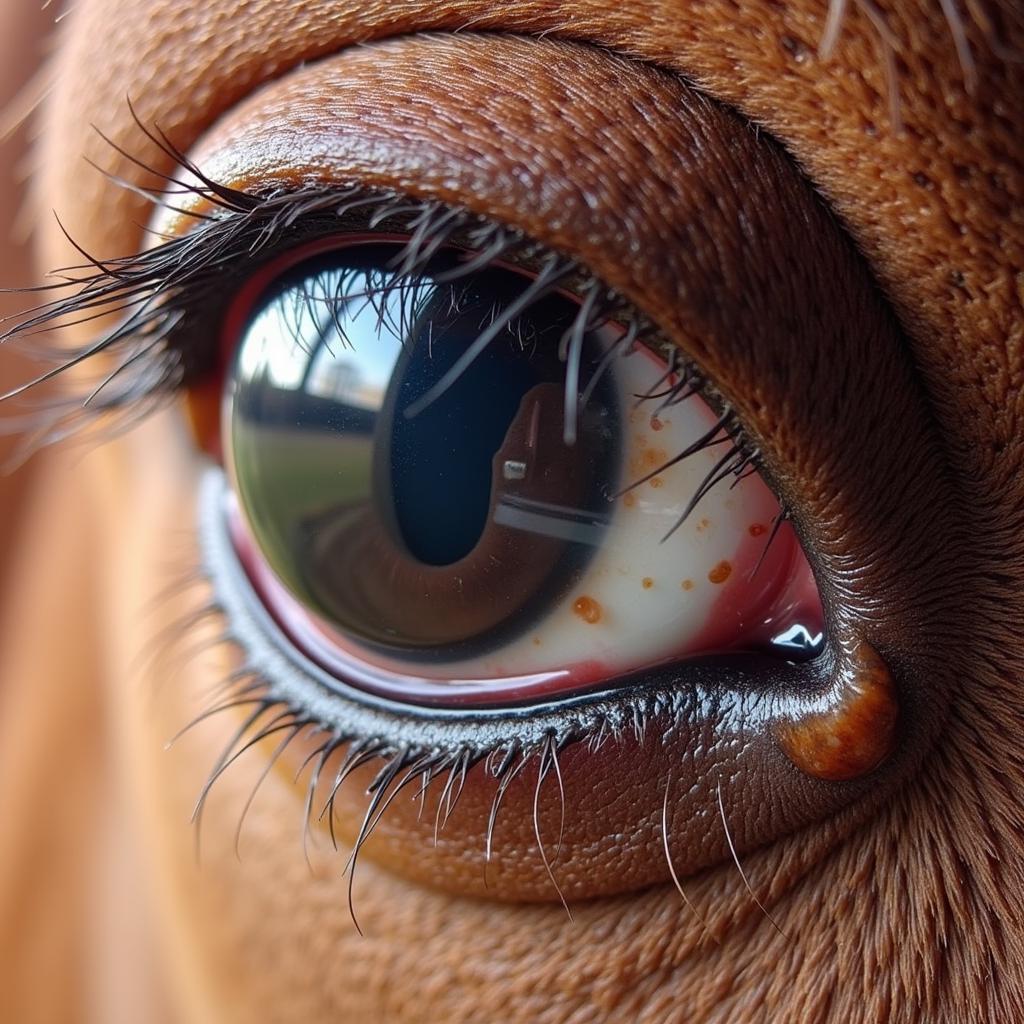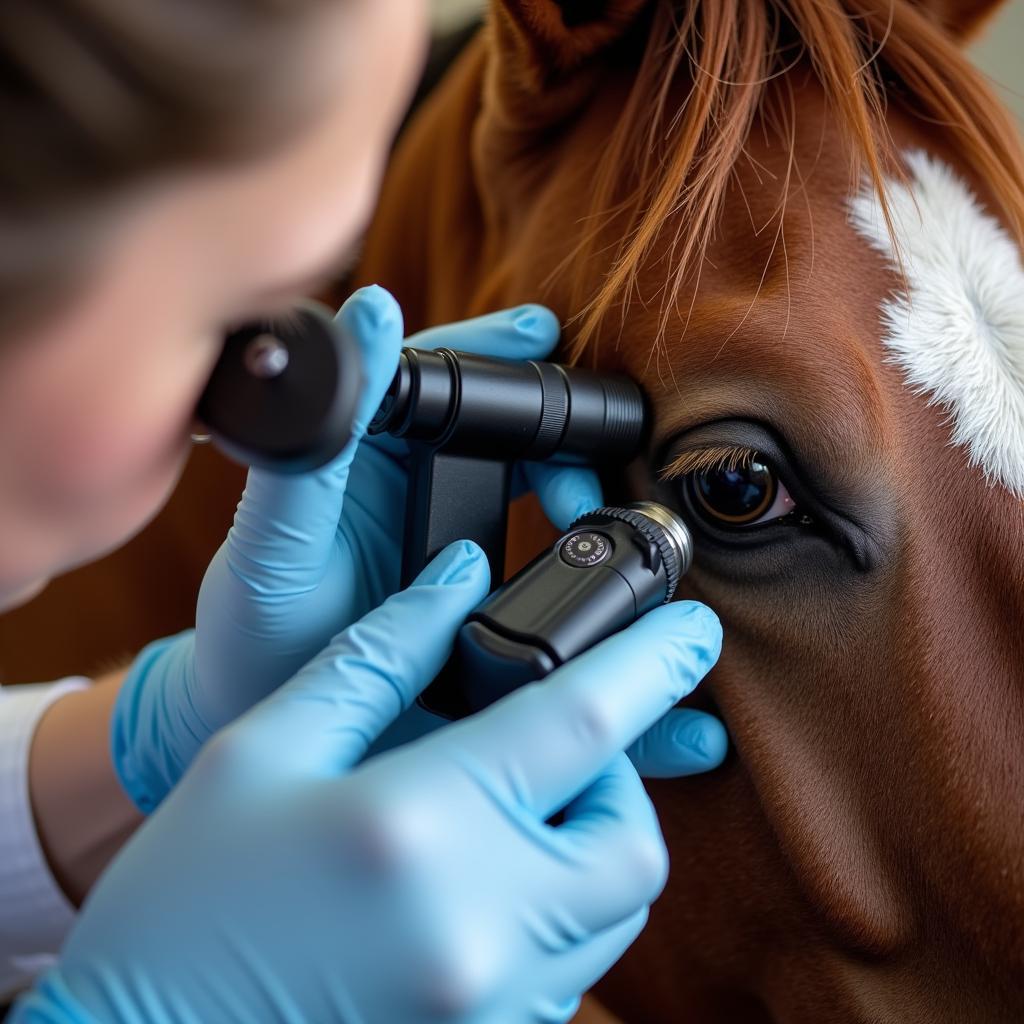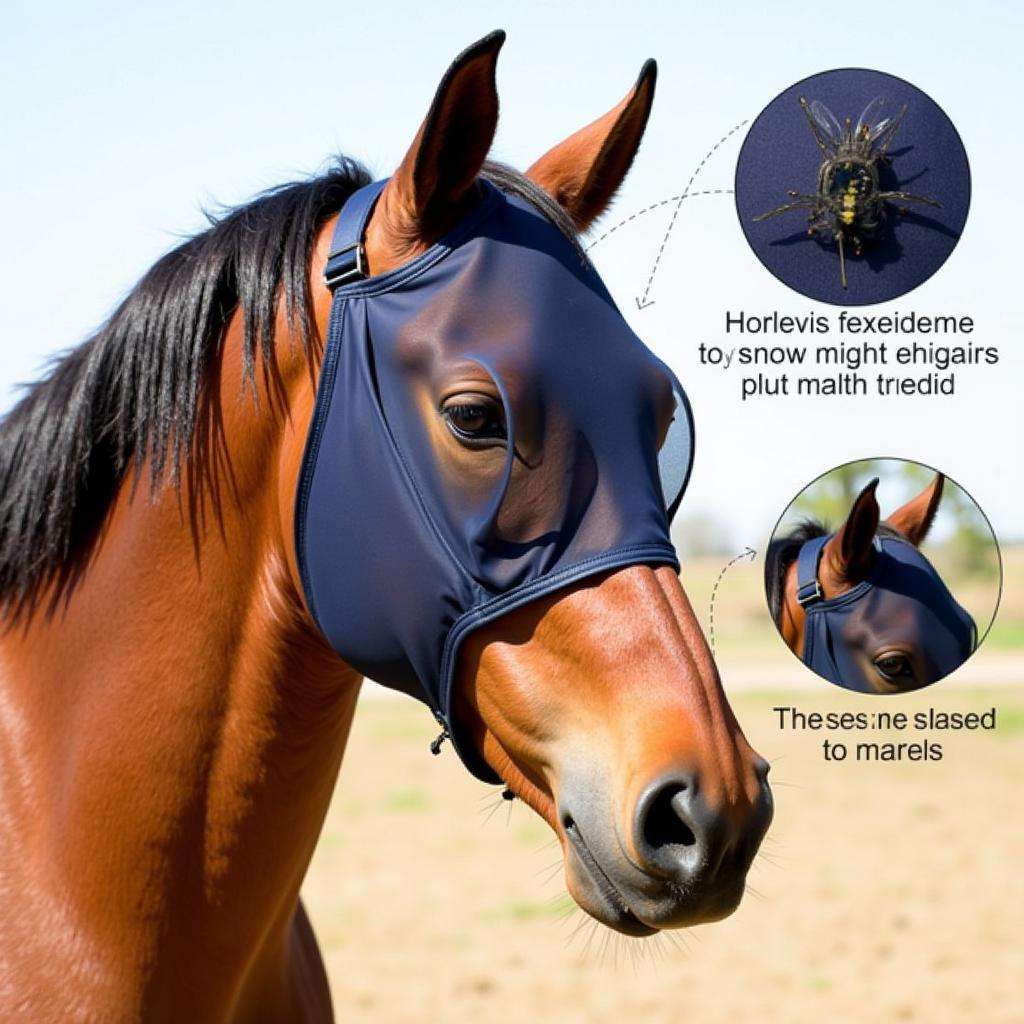Ulcer In Horses Eye, also known as corneal ulcer, is a serious condition that requires immediate veterinary attention. It’s a break in the cornea, the clear front surface of the eye, and can lead to significant pain, vision impairment, and even blindness if left untreated. Understanding the causes, symptoms, and treatment options for ulcers in horses is crucial for any horse owner.
Understanding Equine Corneal Ulcers
Corneal ulcers are unfortunately relatively common in horses. They can result from a variety of causes, ranging from minor trauma to infections. The cornea, being the outermost layer of the eye, is susceptible to scratches, abrasions, and foreign bodies. Even a small piece of hay or dust can cause a scratch that, if infected, can develop into a more serious ulcer. Horses with habronema horse eye may be more prone to developing ulcers.
Common Causes of Ulcers in Horses
Several factors can contribute to the development of a corneal ulcer:
- Trauma: This is the most common cause, including scratches from branches, hay, or even another horse’s hoof. Foreign bodies like dust, sand, and plant material can also cause corneal abrasions.
- Infections: Bacterial, viral, and fungal infections can cause or complicate corneal ulcers. These infections can significantly worsen the ulcer and delay healing.
- Eye Diseases: Certain eye diseases, such as equine recurrent uveitis (ERU), can predispose a horse to developing corneal ulcers.
- Chemical Irritants: Exposure to irritating chemicals, such as fly sprays or cleaning solutions, can damage the cornea and lead to ulceration.
- Habronema Larvae: These parasitic larvae can cause granulomatous lesions, including ulcers, typically in the medial canthus of the eye.
 Close-Up of a Horse Eye Ulcer
Close-Up of a Horse Eye Ulcer
Recognizing the Signs: Symptoms of a Corneal Ulcer
Recognizing the signs of an ulcer is vital for prompt treatment. Some common symptoms include:
- Excessive Tearing: The eye will produce more tears than usual, appearing watery.
- Squinting or Blinking: The horse may squint or blink excessively due to pain and discomfort.
- Redness and Swelling: The eye may appear red and inflamed, with swelling around the eyelids.
- Cloudiness of the Cornea: The cornea may appear cloudy or hazy in the affected area.
- Light Sensitivity: The horse may be sensitive to light, avoiding bright areas.
- Discharge from the Eye: A clear, watery, or even pus-like discharge may be present.
Diagnosis and Treatment of Equine Corneal Ulcers
If you suspect your horse has a corneal ulcer, contact your veterinarian immediately. A proper diagnosis is crucial to determine the severity of the ulcer and guide appropriate treatment. Your veterinarian may use a special dye called fluorescein, which stains the ulcerated area, making it easier to visualize.
 Veterinarian Examining a Horse's Eye for Ulcers
Veterinarian Examining a Horse's Eye for Ulcers
Treatment Options for Corneal Ulcers
Treatment typically includes:
- Topical Antibiotics: Antibiotic ointments or drops are used to prevent or treat infection.
- Pain Relief: Pain medication can help alleviate discomfort and reduce squinting.
- Serum or Plasma Drops: These drops can help promote healing and reduce inflammation. You might want to learn more about kenalog for horses for other conditions.
- Atropine: This medication dilates the pupil, relieving pain caused by spasms.
- Surgery: In severe cases, surgery may be necessary to repair the cornea.
- Fly Masks: Using a horse fly mask eyes can help protect the eye and prevent further irritation. This is particularly important in cases where flies are contributing to the problem, as seen with treatment for summer sores in horses.
Preventing Corneal Ulcers in Horses
Prevention is always the best medicine. Here are some tips to protect your horse’s eyes:
- Maintain a Safe Environment: Remove sharp objects, overhanging branches, and other potential hazards from pastures and stalls.
- Use Fly Masks: Fly masks can help prevent flies and other insects from irritating the eyes.
- Proper Fly Control: Implement effective fly control measures around the stable and pastures.
- Prompt Treatment of Eye Injuries: Any eye injury, no matter how small, should be examined by a veterinarian.
 Horse Wearing a Fly Mask for Eye Protection
Horse Wearing a Fly Mask for Eye Protection
Conclusion
Ulcer in horses eye is a serious condition that requires prompt veterinary attention. By understanding the causes, symptoms, and treatment options, you can help protect your horse’s vision and overall well-being. Early detection and treatment are crucial for preventing complications and ensuring a full recovery. Remember, if you suspect your horse has an eye problem, always consult with your veterinarian.
FAQs
- What are the first signs of an ulcer in a horse’s eye? Excessive tearing, squinting, redness, and cloudiness of the cornea are common early signs.
- Can a horse go blind from an eye ulcer? Yes, if left untreated, a corneal ulcer can lead to blindness.
- How long does it take for an eye ulcer in a horse to heal? Healing time varies depending on the severity of the ulcer, but it can take several weeks or even months.
- How can I prevent eye ulcers in my horse? Maintain a safe environment, use fly masks, and treat any eye injuries promptly.
- What should I do if I think my horse has an eye ulcer? Contact your veterinarian immediately for diagnosis and treatment.
- Can a horse with an eye ulcer still be ridden? It’s best to avoid riding until the ulcer has healed to prevent further irritation or injury.
- Are certain breeds of horses more prone to eye ulcers? Not necessarily, but horses with prominent eyes or pre-existing eye conditions may be at higher risk.
Common Scenarios and Questions
- Scenario: Your horse has suddenly started squinting and tearing excessively. Question: Should you wait and see if it gets better or call the vet? Answer: Call the vet immediately.
- Scenario: You find a small scratch on your horse’s eye. Question: Is it necessary to treat it? Answer: Yes, even minor scratches can develop into ulcers if infected.
Further Reading
For more information on related eye conditions, you can visit our articles on horse eye swelling.
Contact Us
If you need further assistance, please contact us: Phone: 0772127271, Email: [email protected]. You can also visit us at QGM2+WX2, Vị Trung, Vị Thuỷ, Hậu Giang, Việt Nam. We have a 24/7 customer service team.